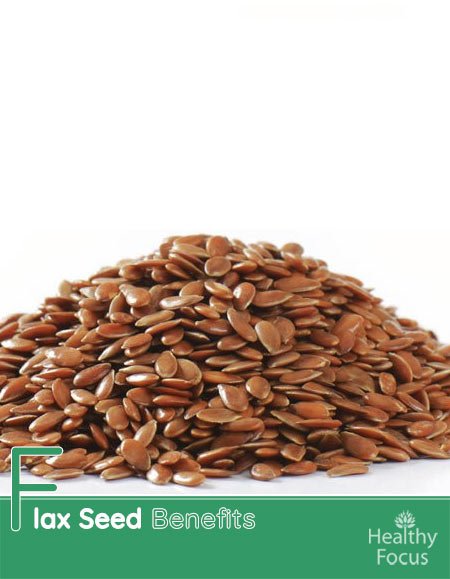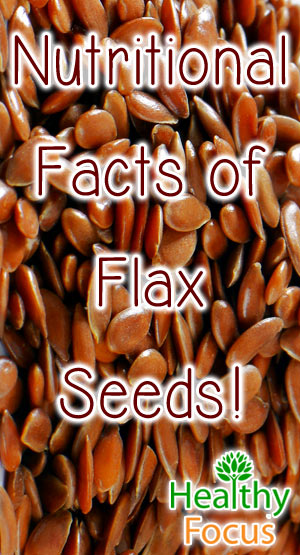Last Updated on January 22, 2019 by Marc Seward
What are Flax Seeds?
Flax seeds also known as linseeds have been cultivated and consumed for so long that they may be considered the world’s first known superfood. It was grown in ancient Babylon around 300 BC and in the 8th Century, King Charlemagne was so sure about its positive health benefits that he actually passed a law requiring that his subjects consumed it.
King Charlemagne may well have been correct, we now know that they provide a vast array of potential physical benefits from improving your digestion and reducing cholesterol to improving your appearance by helping your skin and controlling your weight.
Flax seeds are small, brown or gold colored seeds grown on cooler regions throughout the world. They are far and away the richest source of healthy alpha-linolenic acid, an omega 3 fatty acid, in the world and they are also the best natural source of powerful antioxidants called lignans possessing some 7 times more than the next best source.
Nutritional Facts
Flax seed contains a variety of excellent nutritional benefits. A one ounce serving of flax seed contains:
- 8 grams of fiber
- 6 grams of healthy protein
- 6 grams of alpha linolenic acid
- Antioxidant lignans
- Vitamins B1 and B6
It also contains a healthy dose of essential minerals including manganese, magnesium, phosphorus and selenium.
Flax seed Benefits
1. High Fiber and Low in Carbohydrates
We are regularly told to consume mire fiber and for good reason. Fiber has many potential positive health effects on the heart and the digestive system and we should be aiming to eat at least 30 to 40 grams each day. Flax seeds are an excellent source of both soluble and insoluble fibers which can aid colon detoxification, reduce the cravings for sugar and help you to lose weight.
Flax seeds contain mucilage gum in high levels. Mucilage is a water soluble gel forming fiber with very positive effects on the digestive system. It prevents food from emptying too fast into your small intestine and increase nutrient absorption meaning you get the most out of the food you eat.
Flax seeds can help satiate the appetite and are also low in carbohydrates making them ideal for people trying to lose weight and cut down on their carbohydrate intake.
2. Omega-3 Content
Flax seeds contain a fatty acid called alpha linoleic acid. It is very similar to the healthy omega-3 fatty acid which makes fish oil and fresh fish so good for you. There is plenty of evidence that the EPA and DHA omega-3 fats found in fish oil have many health benefits especially for the heart.
Around 20% of the alpha-linolenic acid found in flaxseeds is converted to EPA but only a very tiny amount is converted into DHA. There is however plenty of evidence suggesting that alpha linolenic acid is healthy in its own right and a diet high in ALA can reduce the4 risk of heart disease and fatal heart attack.
3. Antioxidant Content
Along with its many nutritional benefits, flaxseeds pack a very powerful antioxidant punch. They actually contain a very high level of lignans which are unique fiber based polyphenols with excellent protective benefits.
Lignans can help slow down the signs of aging, balance the hormones and prevent cellular decay. A host of illnesses can be related to cellular damage caused by free radicals and the more natural antioxidants that we can get into our system, the better.
The good news regarding flaxseeds is that they contain around 700% of the lignans than any other natural source. Antioxidant polyphenols like lignans also support the growth of good bacteria in the gut and help to eliminate fungus and yeast from the body. They also have antiviral and antibacterial abilities which can help prevent colds, flu and other illnesses.
4. Cholesterol Levels
Research shows that increasing your intake of flaxseeds can help reduce your cholesterol levels naturally. They work because the soluble fibers can prevent fats and cholesterol being absorbed into the body.
The soluble fiber content in flaxseeds is also important as it can trap the bile which is produced from cholesterol. The trapped bile then gets excreted through your digestive system which forces your body to produce more by utilizing excess cholesterol and therefore reducing overall cholesterol levels in the blood.
One study published in 2008 found that dietary flaxseed could reduce LDL and overall cholesterol levels by up to 10%. (1) Another more recent study published in 2015 confirmed these results when subjects were given 30 grams of flaxseed daily for 12 months.
5. Skin and Hair
As well as their many internal health benefits, flaxseeds can also help improve your appearance by helping you achieve better looking and healthier skin and hair. Just adding a tablespoon or 2 of flaxseeds to your smoothie each day can help improve your skin and keep your hair looking younger and stronger.
The minerals, vitamins and Omega-3 fatty acids found in flaxseeds help reduce dryness and flaking in the skin. Many people have experienced an improvement in skin conditions like eczema, acne and rosacea by adding flaxseeds to their diets.
Flaxseed oil is an especially effective natural remedy for dry skin and hair. Consider making your own moisturizer by combining a tablespoon of flaxseed oil with your favorite essential oils.
6. Weight Control
A diet high in flaxseeds can help combat obesity and bring your weight under control. Because they are such a rich source of fiber and nutritional fats, they can help you to feel full for longer and reduce your cravings for snacks throughout the day.
Consuming fewer calories is obviously going to help you lose weight and flaxseeds are a great option especially when they are used as part of an overall healthy weight loss program. You can sprinkle some ground flaxseed onto your salad or into your smoothies to help keep the cravings at bay.
7. Digestive System
One of the biggest health benefits you can get from consuming flaxseeds is the effect they have on your digestive system. The alpha-linolenic acid contained by the seeds helps to protect the stomach’s lining and maintain good gastrointestinal health.
Research has demonstrated that it can help treat numerous inflammatory digestive complaints including Chron’s disease because of its anti-inflammatory ability. Flaxseeds are a rich source of healthy fiber known to improve digestive health.
The type of fiber in flaxseeds also promotes the growth of friendly gut bacteria and helps detoxify the gut. Flaxseeds can also help relieve constipation naturally and prevent diarrhea.
8. Cancer
There is a certain amount of evidence that flaxseeds can help the body fight numerous types of cancer including breast, ovarian and colon cancer. One study published in 2002 found that flaxseeds could inhibit the growth of breast cancer cells and reduce the risk of women developing the disease. (3)
The antioxidant lignans in flaxseed are thought to be responsible for this effect. (4) Other studies have demonstrated that these lignans can also help reduce ovarian and endometrial cancer risks.
9. Menopause
The same lignans mentioned above also have a beneficial effect on menopausal women by relieving the symptoms of the menopause and potentially offering a natural alternative to hormone replacement therapies. They work because lignans have estrogenic activity which may also effectively combat osteoporosis and help women achieve a more regular menstrual cycle.
How to Eat Flaxseeds
If you want to start adding flaxseeds to your diet, be adventurous. There are a variety of ways that you can use them including as an ingredient in your cookie, cake and bread recipes. Studies show that baking flaxseeds for up to 3 hours has no detrimental effect on their ALA content.
If you are not a fan of baking, there are many other ways to get more flaxseed into your diet:
• Mix a tablespoon or so into your yogurt or smoothie.
• Sprinkle some over your salads.
• Add it to your oatmeal or breakfast cereal.
• Sprinkle some over your salad to add bite and keep your hunger at bay.
(1) http://www.ncbi.nlm.nih.gov/pubmed/18328014
(2) http://www.ncbi.nlm.nih.gov/pubmed/25694068
(3) http://www.ncbi.nlm.nih.gov/pubmed/12588699
(4) http://www.ncbi.nlm.nih.gov/pubmed/15849746


Leave a Reply
You must be logged in to post a comment.